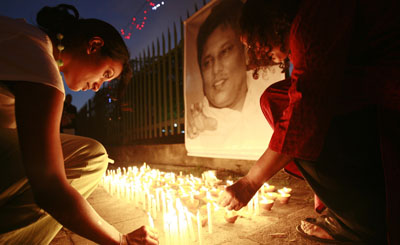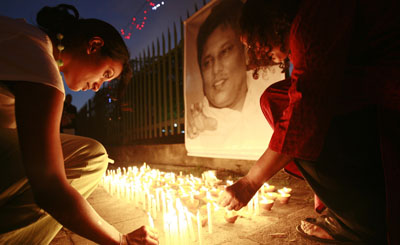By Bob Dietz

CPJ’s March 2009 special report, “Failure to Investigate,” addressed three severe attacks on the media in January of that year. CPJ also found a broad pattern in which “top journalists had been killed, attacked, threatened, and harassed since the government began to pursue an all-out military victory over the Liberation Tigers of Tamil Eelam (LTTE) in late 2006.”
More in This Report
• No peace dividend for press
• Jaffna’s media minefield
• Database of murdered
Sri Lankan journalists
The January 2009 violence started with the bombing of the country’s most popular independent television station and continued with the brutal, rush-hour killing of a prominent newspaper editor who had made his name taking on the Rajapaksa government. A third attack left another newspaper editor wounded and frightened enough to flee the country with his wife, who was also wounded in the attack.
Here is an update on the status of the investigations into those attacks:
• On January 6, 2009, the country’s main independently owned TV station, Sirasa TV, was raided in the early morning by 15 to 20 armed, masked men who blew up the station’s main control room.
While the station is back in operation today, the devastated control room is sealed. The station’s owner, Maharajah TV, is locked in a dispute with its insurance company, and police have asked that the space not be disturbed while they continue their investigation. Sirasa staffers, however, said there is no evidence of any active police investigation at the scene.
National Police spokesman Prisantha Jayakody said the investigation is ongoing but provided no details. No arrests have been made.
• The second attack still reverberates in Sri Lanka. At around 10 a.m. on January 8, 2009, the editor-in-chief of The Sunday Leader, Lasantha Wickramatunga, was killed by eight men on four motorcycles who attacked him with metal and wooden poles after cutting off his car on a busy street just outside Colombo.
Wickramatunga had been receiving anonymous death threats by phone and text message for months, according to his brother,
The Mount Lavinia Magistrate’s Court has been hearing the case monthly but has yet to bring indictments. Over the year, the court focused on Wickramatunga’s mobile phone records to determine the source of the death threats, but the Criminal Investigation Division (CID) of the National Police recently told the court that it considers that lead to be a dead end. The CID said it sees no way to determine who had been threatening Wickramatunga before he was killed.
The case became politicized in the aftermath of the January 26 presidential elections and the arrest of the opposition candidate, retired Gen. Sarath Fonseka. On March 28, Attorney General Mohan Peiris alleged in a written submission to the Supreme Court that senior military officer Brig. Duminda Keppetiwalana was involved in an unspecified manner in the murder. Keppetiwalana was one of about 50 military leaders allied with Fonseka who were arrested after the presidential election on charges of conspiring to overthrow the government. He was released on bail on April 30.
Lal Wickramatunga and The Sunday Leader’s current editor, Frederica Jansz, face a potentially devastating lawsuit from Defense Secretary and presidential brother Gothabaya Rajapaksa, who has already won an injunction barring the paper from mentioning him by name. That suit, which challenges the paper’s critical reporting of the defense secretary, is making its way through the system and could bankrupt Leader Publications if the court finds against the company.
• Keppetiwalana was also broadly accused by the government with being involved with the third January 2009 attack, which came on January 23, 2009. Upali Tennakoon, editor of the Sinhala-language, politically moderate weekly Rivira, and his wife, Dhammika, were driving to his office when four men on two motorcycles forced their car to stop and smashed its window. One attacker used a metal bar with a single sharp point to hit Tennakoon in the face and hands when he put them up to defend himself. Both hands received deep puncture wounds. Another attacker reached into the car and stabbed at him with a knife, but only nicked Tennakoon’s stomach. His wife fought back, throwing her body over her husband to protect him, the couple said. The attackers fled. The couple told CPJ they were mystified by the attack.
The Tennakoons fled to the United States in March 2009. The couple said they have not been questioned or contacted since an initial meeting with the police while they were in the hospital recovering from the attack. They told CPJ they do not expect that the case will ever be prosecuted, and that they have no plans to return to Sri Lanka.
National Police spokesman Jayakody said the investigation is ongoing.
Bob Dietz is CPJ’s Asia program coordinator.
